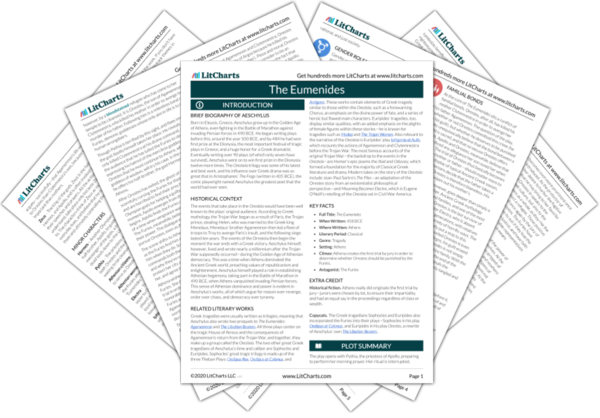Revenge vs. Justice
The Eumenides has two prequels—Agamemnon and The Libation Bearers—and these three plays together form Aeschylus’s trilogy called the Oresteia. In both of those first two plays, revenge and justice are essentially equated—that is, paying back someone who has wronged you is considered the right and moral thing to do. In The Eumenides, however, revenge and justice are not only defined as two separate concepts, but in fact often stand opposed to…
read analysis of Revenge vs. JusticeGender Roles
Gender roles play an active part in The Eumenides, and the divide between the sexes is vividly depicted in a series of conflicts. The first of these clashes comes between the female Chorus of Furies and the male Apollo. The lord of light and prophecy, Apollo is outraged that the irrational, vengeful, female Furies dare to defy him. The Furies, in contrast, react with scorn and wrath at the idea of Apollo infringing…
read analysis of Gender RolesFamilial Bonds
At the core of The Eumenides sits a conflict of familial bonds. Orestes, after all, has killed his mother Clytemnestra in order to avenge her murder of his father Agamemnon. The question of the play, then, is not whether or not Orestes committed this crime (he never denies his guilt), but whether he deserves to be punished for it. The Furies unequivocally believe that the bond between a mother and child is sacred…
read analysis of Familial Bonds
The Power of the Gods
As in Agamemnon and The Libation Bearers before it, The Eumenides contains numerous mentions of and prayers to the gods by its mortal characters, all of whom clearly fear and revere divine power. The Eumenides, however, contains a crucial difference: in this play the gods themselves become physically-present characters. Their conflicts and decisions are of titanic proportions, and have huge consequences on the humans and civilizations around them, creating a sense of scale that…
read analysis of The Power of the GodsThe Power of the Polis
While characters both mortal and divine drive the events of The Eumenides, there is another figure that is equally important: the city-state of Athens. During the Classical Age of Greece, when playwright Aeschylus wrote, the city-state, or polis, was considered the pinnacle of civilization—and Athens was considered the pinnacle of polises. In fact, the worst punishment for a citizen of Athens was not death, but banishment. It was believed that a man could…
read analysis of The Power of the Polis






